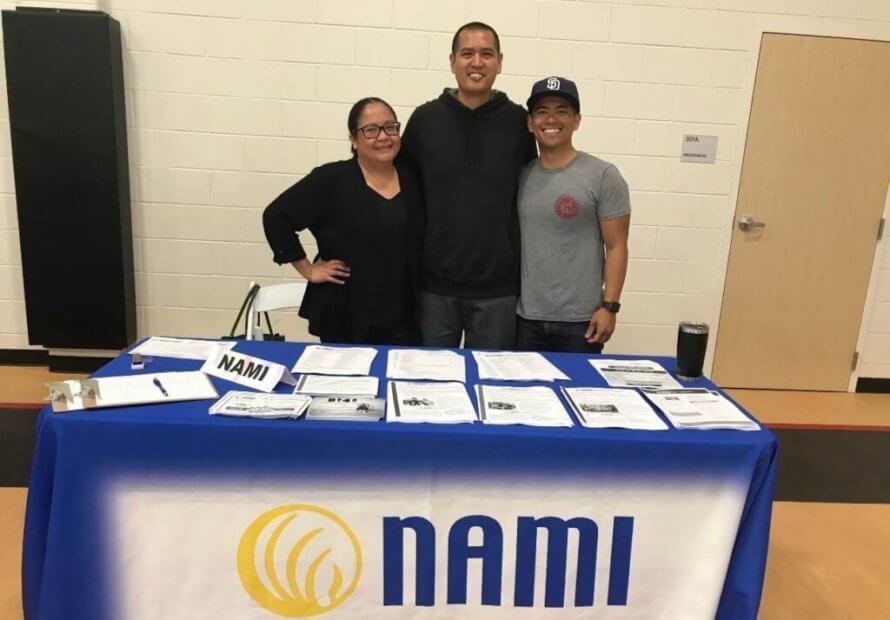
Since he lives with bipolar disorder and has manic episodes, Chris thought someone was out to get him, or that things were happening to him when they were not. He was admitted into the Laurel Ridge Treatment Center and stayed there for two weeks. “That’s where my journey started with my mental illness … that junior year in high school,” Chris said. “After that I was on medication.”
Chris’s story may be hard to read as he shares with unusual candor about his experiences with mental illness and suicide. For Chris, though, the story leads toward transformation and hope.
He’s now 37, has three children with his former wife, and has found stability in his life thanks to the support provided by NAMI San Antonio, an organization that helps people cope with mental illness.
NAMI, which stands for the National Alliance on Mental Illness, has been a stabilizing force in Chris’ life. He attends classes and also helps his peers by sharing his own journey. This month, we’re highlighting Chris’s story, and the story of NAMI San Antonio, with October being National Depression and Mental Health Screening Month.
“NAMI San Antonio estimates 400,000 people in Bexar County will have a mental disorder of some kind each year.”
According to data from the U.S. Census Bureau, the most common mental illness in the U.S. is anxiety disorder, which impacts 40 million adults each year, roughly 18.1 percent of the population. Only 45 percent of adults and 51 percent of children ages 6-17 will receive treatment. Half of all lifetime mental illness begins by age 14, and 75 percent by age 24.
Chris describes himself as a loner throughout public school. He transitioned into taking all special ed classes after his episode and earned a high school diploma because of all of the credits he finished prior to being hospitalized.
“That was a great accomplishment to graduate high school and get a high school diploma and walk the stage,” he said. “So that was a really good, great moment. One thing I’ve learned is that being productive, and having something to do, and being busy, is very … good for me.”
After high school, Chris decided to take a break from school. He had a lot of time on his hands, and he thought he was doing well enough to go off his medication. As he puts it, “I was in denial about being bipolar. I never thought I [was] bipolar.” So he stopped taking medicine, and another episode sent him back to the hospital. He’s been hospitalized more than 13 or 14 times throughout his life, he said. He struggled to hold down a job until he was introduced to the David L. Carrasco Job Corps Center in El Paso.
“When I was at Job Corps, I was stable,” he said. “I had a good time there. I did extracurricular activities there. I was kind of like the fun-loving kind of guy, on my medication, and doing karaoke.”
He had done theater in high school, so being on stage was a natural fit for him. He was then asked to be the announcer at the basketball games at the Job Corps campus. He did well and eventually got a job working for Norwegian Cruise Line as a dishwasher, stationed out of Honolulu. While on the ship, again, he stopped taking his medication.
“I got into an argument with somebody on the ship that wasn’t even talking to me, but talking to somebody else,” he said. “And so I ended up threatening to jump off the ship. I got suicidal. They escorted me back to San Antonio. They had a nurse escort me to make sure I didn’t do anything dumb.”
He was invited back to Norwegian Cruise Line, as long as he committed to staying on his medication. “I thrived over there. … So I was able to function and grow with other people when they had Bible studies there. They had a Catholic church service in one of the rooms, and I was really happy … I felt welcomed.”
In 2008 his mom introduced him to NAMI San Antonio, and he’s in a stable place in his life, thanks to their support.
“I think what Chris also exemplifies is what I see in a lot of peers, which is an incredible amount of perseverance,” said Doug Beach, NAMI San Antonio’s board president and acting executive director. “Many people, if they had all these obstacles in their path, they would just quit.”
“My job is not to fix him,” Beach said. “My job is to listen, and support him, and help him accomplish his goals.”
Part of NAMI’s role, Beach said, is to help families understand how to support someone who’s living with a mental health diagnosis.
“How do you help them do what Chris has been able to accomplish, and his parents?” Beach said. “As he said, his parents have been involved, his mom particularly has been involved with NAMI for years.”
“My job is not to fix him,” Beach said. “My job is to listen, and support him, and help him accomplish his goals.”
Mental illness, as Beach notes, is a condition that affects a person’s thinking, feeling, or mood.
NAMI San Antonio serves several thousands of people every year, from the roughly 200 active members, to the 2,500 people who registered for its Pathways to Hope two-day virtual conference, to the 922 people in NAMI support groups. Education and support programs in San Antonio and surrounding areas serve people living with a diagnosis, family members living with someone with a diagnosis, and military veterans. Recently, NAMI San Antonio started an on-campus program for high school students. It also provides awareness through partnerships and outreach, which reach thousands of people locally.

“And a significant percentage of those have an illness that is chronic, and lifetime,” Beach said. That’s probably in the range of 125,000 people locally. “So the numbers are staggering.”
Bipolar disorder and schizophrenia are two of the most well-known mental illnesses, but, as Beach points out, many people experience some sort of post-traumatic stress disorder, or PTSD. “We think of that as being people who have been in combat,” Beach said, “but the truth is, there are more people that have experienced PTSD in the United States, who have been in car accidents than any other reason for PTSD. Sexual assault is also another often common source of PTSD. So it’s a wide spectrum.”
Chris is fully immersed in everything NAMI has to offer. He also started attending Alcoholics Anonymous in 2015, and a few years before that, started attending San Antonio Clubhouse and volunteering with the Red Cross and Haven for Hope.
The key is staying busy and having a support system around him.
“I learned to stay attached to my medication and stay close to my health care team … my psychiatrist, my therapist,” Chris said, “and to take them with me on this journey. And not leave him out.”
If you or someone you know is having thoughts of suicide or is in emotional distress, contact the National Suicide Prevention Lifeline at 1-800-273-TALK(8255) or at suicidepreventionlifeline.org.
